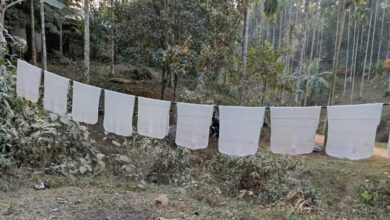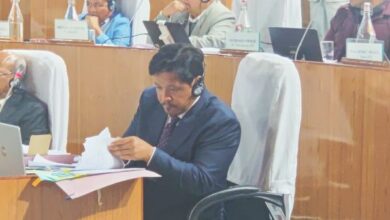Meghalaya elections 2023: Fight of freebies
Political parties must eschew election doles as it will put pressure on economy

As the election season approaches every five years, political parties loosen their purse strings to dole out freebies to woo voters, trying to outdo each other in the frenzy. While voters get bedazzled by the offers, political leaders seldom consider the sustainability of such incentives.
This is election season in Meghalaya and the ‘political offerings’ have already started. With a new entrant, the All India Trinamool Congress (AITC), which is known for its freebies in its home state West Bengal, the competition for doles has gotten better this time. The incumbent National People’s Party (NPP) has also shown its efficacy in announcing incentives for voters as well as questioning the veracity of the opponent’s freebies.
Recently, Chief Minister Conrad Sangma, who is the national chief of NPP, criticised the AITC leadership for announcing doles without weighing the economic consequences for the small hill state.
The two schemes which were targeted by Sangma are —WE card and MYE card. The former is a financial scheme for women where beneficiaries or cardholders will get Rs 1,000 per month. The latter is a similar scheme for unemployed youths. Registration for both has already started and AITC supremo Mamata Banerjee, who is also the chief minister of West Bengal, has promised that if her party comes to power, the money will be disbursed within 100 days. But Sangma flagged a concern that these schemes, if implemented, would bleed the state exchequer and Meghalaya would sink into a debt trap.
Sangma’s concern was not unfounded, especially if one looks deep into the economy of West Bengal where AITC is in power. Last year’s budget estimates put the state’s accumulated debt for 2022-23 at Rs 5.86 lakh crore. It was Rs 5.28 lakh crore as on March 31, 2022. In 2010-11, the figure was Rs 1.97 lakh crore. It is a near debt-trap situation as only fresh borrowings can be utilised to cover the old debts.
According to the Reserve Bank of India last year, West Bengal is among the 10 states with the highest debt burden. The fiscal vulnerability has been analysed based on the debt-GSDP ratio in 2020-21. Last January, the state borrowed Rs 6,500 crore in three tranches. “Taking into account the warning signs flashing from all the indicators, we can identify a core subset of highly stressed states from among the 10 states identified by the necessary condition i.e., the debt/GSDP ratio. The highly stressed states are Bihar, Kerala, Punjab, Rajasthan, and West Bengal,” RBI said in its report.
“Some states like Rajasthan, West Bengal, Punjab and Kerala spend around 90 per cent in revenue accounts. This results in poor expenditure quality… Although welfare-enhancing, the impact of revenue spending on economic activity lasts for just about a year. In contrast, the impact of capital outlay is stronger and lasts longer, with the peak effect materialising after two-three years,” it added.
AITC has announced a slew of schemes in West Bengal since it came to power in 2011. In fact, it has rejected central schemes and introduced homegrown welfare incentives. Among them are Krishak Bandhu against PM-Kisan (Rs 5,000 a year as crop cover and life insurance of Rs 2 lakh), Green Cities Mission against Smart City, Anandadhara against National Rural Livelihood Mission and Banglar Griha Prakalpa against PM Awas Yojana, among others. These are apart from the local schemes like Kanyashree for girl child education and Lakshmir Bhandar for economically backward women. While supporters and well-wishers of AITC sing paean about the schemes, the Bengal government’s decisions are drying the state coffers.
During a recent press conference, AITC national general secretary Abhishek Banerjee clarified that there were enough funds in the state which were not being channelised properly.
But as Sangma criticises West Bengal and its ruling party, he should also introspect about the economic health of Meghalaya, which is highly dependent on central funds because its only sources of revenue are minerals and tourism. The state revenue earnings dipped drastically post-2014 following the ban on rat-hole coal mining.
In 2019, the state government sought Rs 82,815 crore loan from the 15th Finance Commission for various development projects. It also took a loan of Rs 1,345 crore early last year to clear the dues of Meghalaya Energy Corporation Limited (MeECL). The already weak state economy post-coal mining ban got another shock in 2020-21 during the pandemic. Data released by RBI last December showed that Meghalaya was among the slowest-growing states.
Sangma’s freebies came much before the TMC’s. He launched FOCUS, FOCUS+, YESS and PRIME. The Farmer’s Collectivisation for Upscaling Production and Marketing Systems (FOCUS) was launched in July 2022, and under this scheme, Rs 5,000 will be given to each farmer who should be part of a producer group.
Taking forward FOCUS, Sangma launched FOCUS+ to provide Rs 5,000 to each household and extended the scheme to urban areas. A farmer will get Rs 10,000 under both schemes but the government is yet to reveal the source of funds.
The youth engagement programme YESS is another financial assistance scheme up to Rs 2 lakh to over 3,000 youth organisations under YESS Meghalaya.
There is more to Sangma’s benevolence when it comes to announcing schemes. Another initiative, PRIME Fund, has a provision for Rs 5 lakh grant to entrepreneurs for start-up programmes and scale-up innovation loans of up to Rs 25 lakh.
The culture of freebies is a contentious topic in Indian politics. Last August, the Supreme Court referred a petition to ban freebies to a three-judge bench.
In a state like Meghalaya that depends largely on central funds, election doles will add to the already existing difficulties. So, keeping in mind such a fragile economy, political parties in the fray should be judicious about announcing incentives to voters as such freebies can only lead to macroeconomic instability. At the same time, the electorate should be intelligent enough to gauge the long-term impact of any dole and its sustainability and not get carried away by the short-term benefits. After all, it is the taxpayers who will be funding the freebies.
– Team Sunday Monitor





